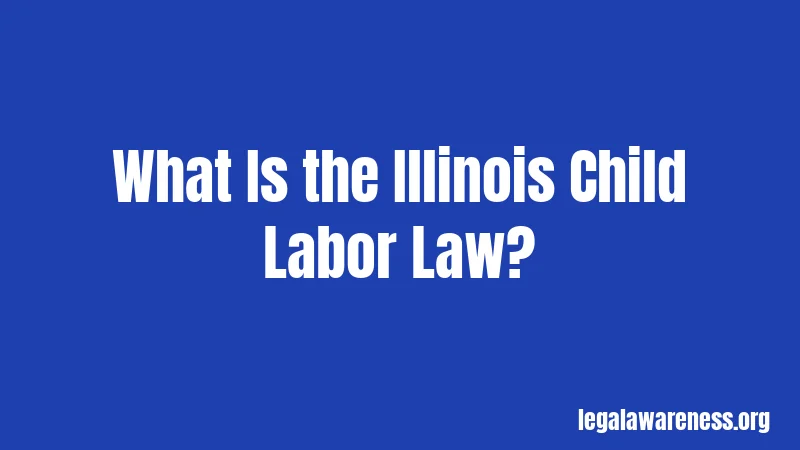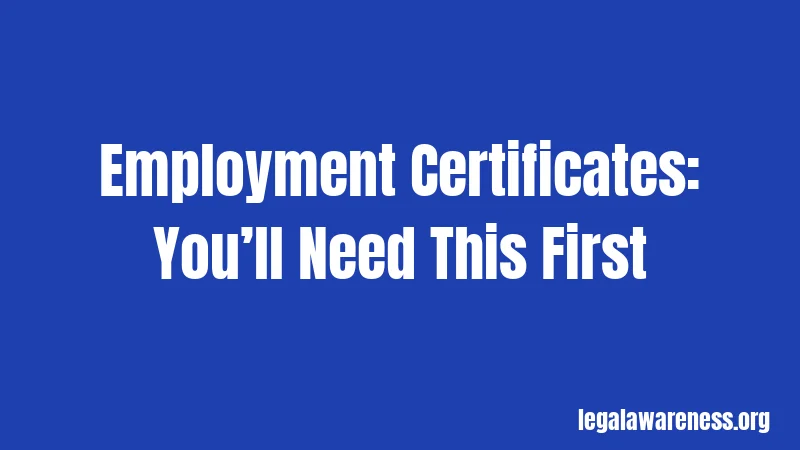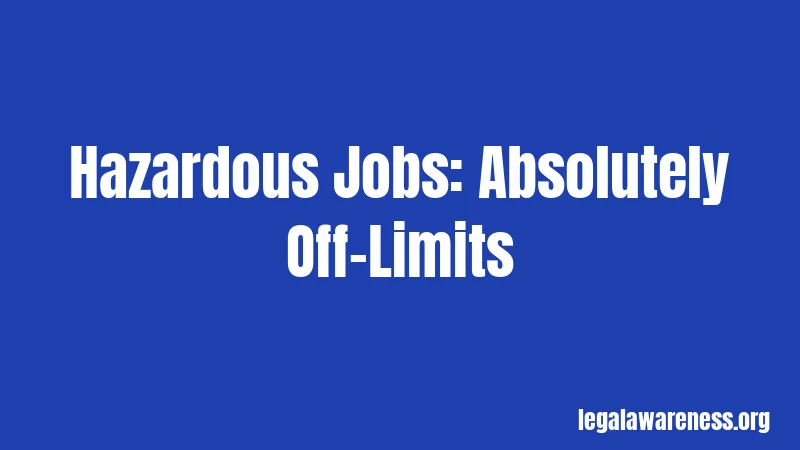Illinois Labor Laws for Minors (2026): The Complete Worker’s Guide
Most teenagers in Illinois want to work. And honestly, that’s awesome. But here’s the thing—Illinois has some pretty strict rules about how young people can work. These aren’t just suggestions. They’re laws that protect you.
In January 2025, Illinois completely overhauled its child labor laws for the first time in 75 years. This wasn’t a tiny update. It was a major rewrite. If you’re a teen thinking about getting a job, or a parent helping your kid find work, you need to know what changed. The rules are different now, and they matter.
What Is the Illinois Child Labor Law?

Okay, pause. Let me break this down simply.
The Illinois Child Labor Law is a state rule that protects young workers. It sets limits on when minors can work, how many hours they can work, and what kinds of jobs are actually allowed. Think of it like a safety guardrail for teenage workers.
The law covers anyone under 16 years old. It says: you can work, but only in certain ways. Your boss can’t make you work too many hours. You can’t work in dangerous jobs. And you need paperwork to prove you’re allowed to work.
Why does this law exist? Because teenagers are still developing. Their brains are still growing. Their bodies need rest. School matters. The law makes sure work doesn’t get in the way of these important things.
Age Requirements: Who Can Work?
Here’s where it gets specific. Not every kid can work at every age.
You have to be at least 14 years old to get a regular job in Illinois. Seriously, that’s the minimum. If you’re 13 or younger, there are very few options. The only real exception? You can caddy at a golf course at age 13. That’s literally it for that age group.
Once you hit 14, doors open up. You can work at 14 and 15, but with lots of restrictions (more on that in a minute). If you’re 16 or 17, you have more freedom. You still can’t work in dangerous jobs, but the rules are less strict about hours.
When you turn 18, you’re basically treated like an adult worker. Most of these special rules don’t apply anymore.
Employment Certificates: You’ll Need This First

Not sure what counts as a violation? Let me clarify something important.
If you’re 14 or 15 in Illinois, you need an employment certificate. This is also called a work permit. You cannot legally work without one. Zero exceptions for regular jobs. This is a real document, not just a conversation.
Here’s how you get one:
Step 1: Your future employer gives you a “letter of intent to hire.” This letter says what job you’ll do, what hours you’ll work, and what days. Take this letter home.
Step 2: Grab your birth certificate or passport (proof of your age). You’ll also need your parent or guardian to come with you.
Step 3: Go to your school or school district office. Find the person who issues work permits (called the “issuing officer”).
Step 4: Bring all your paperwork. Your parent or guardian needs to be there in person. They need a valid ID too.
Step 5: The issuing officer approves it (or doesn’t). If approved, you get your certificate.
The whole thing usually takes a few days. Plan ahead. Don’t wait until the day before you’re supposed to start.
If you’re 16 or 17, you don’t need a work permit. Your employer can hire you without one. But you still need to follow all the hour and job restrictions.
Working Hours: This Part’s Super Important
Sound complicated? It gets clearer when you see the actual numbers.
Illinois has strict rules about when you can work. These rules change depending on whether school is in session. Here’s what you need to know:
If you’re under 16 and school is in session:
You cannot work more than 3 hours on any single school day. You also can’t work more than 8 hours total between work and school combined on a school day. So if you’re in school from 8 a.m. to 3 p.m. (that’s 7 hours), you can only work 1 hour that day.
During the entire school week, you can’t work more than 18 hours total. That sounds like a lot, but spread it over 5 days? It’s not much.
You can’t work before 7 a.m. or after 7 p.m. (except during summer).
If you’re under 16 and school is NOT in session:
Now there’s more freedom. You can work up to 40 hours per week. That’s still a lot for a teenager, though.
You still can’t work before 7 a.m. Between Labor Day and June 1, work must end by 7 p.m. From June 1 to Labor Day (summer), you can work until 9 p.m.
You can’t work more than 8 hours in any 24-hour period. So even during summer, daily limits exist.
If you’re 16 or 17:
Honestly, you’ve got it easier. Illinois doesn’t restrict your hours during non-school times. You can work as much as you want (as long as it’s not during school hours, obviously).
But you still have limits during school days. You can’t work when you’re supposed to be in class.
All ages under 16: The meal break rule
If you work 5 hours straight without a break, your employer has to give you at least a 30-minute meal period. That’s the law. Some employers think this is optional. It’s not.
Also, you cannot work more than 6 days in a single week. So at least one day off per week is guaranteed.
Hazardous Jobs: Absolutely Off-Limits

Wait, it gets better. Here’s where it gets interesting.
There are about 30 types of jobs that minors under 18 absolutely cannot do in Illinois. These aren’t suggestions. These are hard stops. If an employer tries to put you in one of these jobs, they’re breaking the law.
You cannot work in:
Factory and manufacturing work (including making products on assembly lines), construction or demolition, operations with power-driven machinery (like a factory floor, bowling alley, or amusement park), anything involving lead, chemicals, dust, or dangerous gases, logging or sawmilling, working with meat processing or slaughter, spray painting, work that requires climbing ladders or scaffolds, working around moving vehicles, laundry or dry-cleaning operations, gas stations or filling stations.
There are more, but those are the main ones. Pretty straightforward.
The reason? These jobs can cause serious injuries. Kids aren’t as physically developed. Their judgment isn’t fully formed yet. An accident that might cause a minor injury to an adult could cause permanent damage to a teenager.
One more thing: you can’t work in places where alcohol is served for drinking on premises. Bars, nightclubs—off limits. The only exception is if you’re serving at a private event (like a wedding), and only as a busboy or server.
Supervision Requirements: A Grown-Up Must Be There
Here’s what most people don’t realize.
When you’re working, an adult supervisor must be present. Not just anywhere in the building. Actually supervising your work. This person has to be at least 21 years old. They’re responsible for making sure you’re working safely and following the rules.
This requirement exists because teenagers need guidance. If something goes wrong, that adult is there to help.
Penalties: What Happens When Laws Are Broken
Now, here’s where it gets serious.
The new law from 2024 really increased the penalties for breaking child labor laws. If you’re a parent or employer, listen up. If you’re a teen, know that the law takes this seriously.
Civil penalties (money fines):
Employers who violate child labor laws can be fined up to $20,000 per violation. Each day a violation continues counts as a separate violation. So if an employer illegally makes a 14-year-old work 30 hours in one week (when the limit is 18), that could be multiple separate violations.
If the violation causes a minor to suffer an injury or illness, the fine goes up to $30,000.
If a minor dies because of a violation? The fine can reach $60,000.
Criminal penalties:
An employer who willfully violates the law or obstructs an investigation can be charged with a Class A misdemeanor. That’s serious criminal charges. Potentially jail time.
Real example: In 2025, the Illinois Department of Labor investigated a fast-food restaurant. Minors were working early morning and late night shifts. They were working more hours than allowed on school days. No meal breaks. No proper work permits. The state recovered $31,000 in penalties from that one case.
Let that sink in. One restaurant. $31,000. And that was a settlement, not a full lawsuit.
Special Rules: Child Performers and Social Media Stars
Wondering if this applies to you? Keep reading.
Illinois has special rules for kids who work in entertainment. If you’re in movies, television, theater, music, or modeling, there are different hour limits. You might be allowed to work more hours than regular teenagers.
Here’s the catch: if you’re earning money as a child performer, your employer has to set up a trust fund in your name. And they have to put 15% of your gross earnings into that fund. You get access to it when you’re a legal adult. It’s designed to protect you financially.
This includes kid influencers too. If you’re a teenager making money from social media (like TikTok, YouTube, or Instagram), these rules apply to you. The state wants to protect your earnings.
Minimum Wage: What You’ll Actually Earn
Let’s talk money. Workers under 18 in Illinois earn the same minimum wage as adults. Actually, wait—let me correct that.
Starting January 1, 2025, Illinois’ minimum wage is $15 per hour for everyone. That includes minors. No lower wage for teenagers. If you work, you get paid fairly.
However, here’s the exception: if you’re a minor and you work more than 650 hours in a calendar year, you automatically get bumped up to the full adult minimum wage anyway. So most teenagers who work through the whole year hit this threshold.
Special Circumstances: What’s Actually Allowed
Confused about the difference? Let me break it down for you.
Not everything a teenager does counts as “work” under the child labor law. Some activities are specifically exempted. This is important because it affects whether you need a work permit and whether the hour restrictions apply.
These DON’T count as regulated work:
Chores at home – Raking leaves at your neighbor’s house for a little cash? Not regulated. But here’s the important part: if your neighbor is a professional landscaping company hiring you to rake leaves for their customers, that DOES count as work and requires a permit.
Babysitting – If you babysit for a family outside school hours in their home, this isn’t regulated. But if you work for a daycare center or babysitting service, it is.
Newspaper or magazine delivery – If you deliver papers outside of school hours, the child labor law doesn’t apply.
Caddying – If you’re 13 or older and caddy at a golf course, you’re exempt from the certificate requirement.
School-based work programs – If your school has a work-study or career program, those are specially regulated but allowed.
What To Do If Your Rights Are Violated
Stay with me here. This is important.
If an employer is breaking child labor laws, you have options. You’re not powerless.
Report it to the Illinois Department of Labor. They investigate violations. You can call their toll-free number: (800) 645-5784. Or visit their website. You can also file a complaint with your school district.
Talk to your parents or guardians. They should know what’s happening. They might need to take legal action on your behalf.
Get help from a lawyer. If the violation caused you harm (like an injury), you might have a legal case. Some lawyers work on these cases for free (called “contingency,” meaning they only get paid if you win).
File a civil complaint. Under the new law, you have up to one year after a violation to file a complaint with the Illinois Department of Labor. The state can then sue the employer.
Take the employer to court. If the Department of Labor doesn’t resolve your complaint within 180 days, you can file a lawsuit yourself.
Don’t be scared to report violations. The law protects you from retaliation. If your boss fires you or punishes you for reporting illegal activity, that’s another violation.
How To Get Your Work Permit: Step-by-Step
Here’s what you need to do right now if you’re 14 or 15 and want to work.
Before you do anything: Get a job offer. Your future employer needs to write that letter of intent to hire. You can’t get a work permit without one.
Gather your documents:
- Birth certificate (original is best)
- Passport (acceptable alternative)
- Your parent or guardian’s valid ID
- The letter from your employer
- Any other documents your school asks for
Go to your school:
- Visit during school hours (obviously)
- Find the work permit issuing officer (usually in the main office)
- Some schools have these officers; others don’t
- If your school doesn’t have one, contact your school district office
Bring your parent or guardian:
- This is non-negotiable
- They must be present in person
- They must have a valid ID
You might need a physical:
- Some schools require a “Certificate of Physical Fitness”
- This is signed by a doctor
- It says you’re healthy enough for the job
- Check with your school first to see if you need it
Wait for approval:
- The issuing officer reviews everything
- This usually takes a few days
- Once approved, you get your certificate
- You get a copy, your employer gets a copy, and the school keeps a copy
Start working:
- Only start after you have the certificate in hand
- Your employer must keep it on file
- You must follow all the hour and job restrictions
Honestly, this is the part most people miss. Don’t skip it.
Frequently Asked Questions
Can I work if I’m 13 years old?
Almost never. The only job allowed for 13-year-olds is caddying at a golf course. If you’re thinking about something else, you have to wait until you’re 14.
Do I still need a work permit if I’m 16 or 17?
No. Once you’re 16, work permits aren’t required. But you still have to follow the hour and job restrictions.
What if my employer doesn’t give me required breaks?
Report them. That’s illegal. Call the Department of Labor or talk to your parent/guardian.
Can I work during school hours if I’m caught up on my homework?
No. The law doesn’t care about homework. If school is in session, you can’t work during school hours.
What’s the difference between the state law and federal law?
Both Illinois and the federal government have child labor laws. Illinois sometimes has stricter rules. Employers have to follow whichever is stricter. You get the better protection.
If I work over 650 hours, do I automatically make more money?
Not automatically, but you’re entitled to the full adult minimum wage. You might need to ask your employer to pay you correctly.
Can I work at a restaurant?
Yes, but with limits. You can work as a server, busboy, or in the kitchen. You cannot work where alcohol is served for drinking (like a bar). You also cannot operate dangerous machinery.
What if an employer asks me to work off-the-books (no pay records)?
That’s illegal. Do not agree to this. Report it immediately.
Final Thoughts
Now you know the basics. The rules are strict, but they exist to protect you.
Illinois takes child labor seriously. The state updated these laws because too many teenagers were being exploited. Too many were working in dangerous conditions. Too many were sacrificing their education.
The new laws say: you can work, but safely. You can earn money, but with limits that protect your health and education.
If you’re a teenager: Get your work permit if you need one. Know your rights. Don’t accept illegal working conditions. Speak up if something’s wrong.
If you’re a parent: Help your teen navigate these rules. Check that their employer is following the law. Make sure their job isn’t interfering with school.
When in doubt, reach out. Call the Illinois Department of Labor at (800) 645-5784. Ask your school. Talk to a lawyer. It’s better to ask a question than to let violations slide.
Stay informed, stay safe, and know your worth.
References
- Illinois Department of Labor – Child Labor Law
- Illinois Department of Labor – Child Labor Law FAQ
- Illinois Department of Labor – Child Labor Law Compliance
- Illinois Legal Aid Online – Working as a Child
- Governor Pritzker’s Press Release on Child Labor Law 2024
- Illinois Department of Labor – 2025 Enforcement Actions
